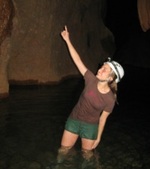Week 3: Interview with Dr. Kristopher Irizarryby Natalie Punt “Intelligent, fast-paced, with a take-no prisoners style of research”, is how my new mentor, Dr. Irizarry, was first described to me. Working with Dr. Irizarry over the summer has compelled me to agree with the description. However, I would like to add another descriptor- extraordinary. I sat down with Dr. Irizarry to ask him about his background, scientific interests, and future direction. Natalie: What was your background starting in high school? Did you prepare for a scientific career? Dr. Irizarry: In high school, I was interested in science and math. As an undergrad at RPI, I mainly took math and science classes that I was interested in, e.g. physical chemistry, quantitative physics, biochemistry and biophysics, and put off declaring a major. My first undergraduate research project was studying how to inhibit cocaine addiction in rats. The project worked well and I was in the lab on Saturdays taking care of the rats. But, I disliked the animal research and ended up doing my senior thesis in Dr. Salerno’s computational biology lab modeling the theoretical structure of Nitric Oxide Synthase. I was interested in multi-disciplinary PhD programs and chose the biomedical graduate program at UCLA. I did rotations in structural biology, cryoelectroscopy, and Drosophila genetics. I almost chose Drosophila genetics for my PhD thesis work, but I changed my mind after a yearlong internship at Insight Genomics. I ended up doing my PhD thesis in Bioinformatics with a new faculty member, Dr. Chris Lee. <During his PhD thesis he developed computational methods to identify functional relevant genetic variations in the human genome that contribute to disease phenotypes> I followed my graduate degree with a 2-year post-doc at UCLA’s Neuropsychiatric Institute where I identified specific genetic variants associated with susceptibility to depression in Mexican-Americans. We used this work to understand clinical patterns of anxiety and depression and predict anti-depressant treatment response rates in patients. I lost interest in human medicine when it became apparent we could discriminate people according to their genotypes. Currently, I am the Director of the Applied Genomic Center at Western University and am working to develop the University’s research program and have on-going projects in dog genetics and sequencing the snow leopard’s genome. Natalie: What’s your favorite research project to date (besides mine)? Dr. Irizarry: The Snow Leopard Project. Snow leopards are endangered carnivores. In the near future, the survival of this species will depend on our understanding of the captive population’s genetic diversity and how their unique biology contributes to their survival in captivity. Natalie: What are your favorite and least favorite things about research? Dr. Irizarry: My favorite thing about research is the ability to define my intellectual interests and pursue them. I’m really interested in understanding the intersection of science and philosophy. Such as, do genes underlying a phenotype help set guidelines for free will or determine one’s fate? For example, whippets with a mutation in their Myostatin protein run faster than whippets lacking the mutation. Do these dogs run faster because they like to or because they can? I wonder if having a better understanding of genetics can help define an individual’s free will. My least favorite thing about research is deciding between projects. Some really good projects with great intellectual interest don’t have funding and are discarded to projects with funding. Natalie: If you had to give advice to an undergraduate considering a career in science, what would it be? Dr. Irizarry: Pursue science for the right reasons. With the current economy, faculty positions and grants are becoming extremely competitive. If you are interested in pursuing a career in research, you should pursue it but with an alternative plan and realistic expectations. Also, being multi-disciplinary is extremely valuable. The days of being just a chemist or a microbiologist are over. Study two or more disciplines with the expectation of using both and developing many more in your career. Dr. Irizarry’s dynamic yet profound interests have allowed him to make many contributions to his fields of interest. I enjoy working with his progressive style of thinking. Currently, he is interested in comparative genomics with the intent of understanding the evolution of genotypes into distinct phenotypes. In doing so he hopes to develop biomarkers to evaluate disease progression in veterinarian medicine. About the Blogger
0 Comments
Your comment will be posted after it is approved.
Leave a Reply. |
The Lab JournalWelcome to the summer internship series of 2012! Follow 9 Scientista bloggers through their summer internships to catch a glimpse of what it is like to be a scientista^TM. By Title- India Presents: A "New World Symphony"
- Through The Lens: The Intricacies Of Diabetes - Do Nanoparticles Glow? - Using Unusual Animals to Study Human Disease - Using the Hubble Telescope - You Think What You Eat - Experimenting With the Life of a Scientist(a) - 18.085: My Summer at MIT - Science Heals: A Summer of Global Health Research By BloggerRabeea Ahmed
Riana Balahadia Shaira Bhanji Nzuekoh Nchinda Amy Beth Prager Natalie Punt Juliet Snyder Pin-Wen Wang Stephanie Wang Archives |
The Scientista Foundation, Inc. All Rights Reserved © 2011-2021 | Based in NY | [email protected]
The Network for Pre-Professional Women in Science and Engineering
The Scientista Foundation is a registered 501(c)(3) -- Donate!
The Network for Pre-Professional Women in Science and Engineering
The Scientista Foundation is a registered 501(c)(3) -- Donate!


 RSS Feed
RSS Feed